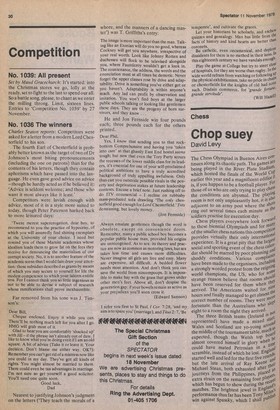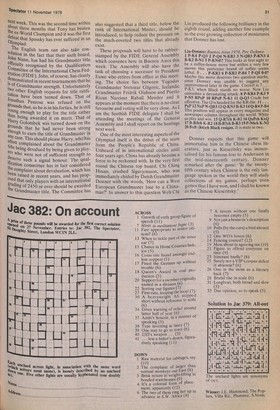Chop suey
David Levy
The Chess Olympiad in Buenos Aires eon' tinues along its chaotic path. The games at being played in the River Plate Stadia', which hosted the finals of the World CuP earlier this year and a magnificent edifice it is, if you happen to be a football player. fur those of us who are only trying to play ale° the conditions are abysmal. The playing room is not only unpleasantly hot, it is als° adjacent to an army post where the shots ring out several times each minute as thc soldiers practise for execution day. Chess players everywhere look forwnr to these biennial Olympiads and for mail!' of the smaller chess nations this competiti°'i provides virtually their only internatioaa, experience. It is a great pity that the large' social and sporting event of the chess CalCd dar should be marred by poor planning allts shoddy conditions. Various complai% have been made to the organisers,incluciA7 a strongly worded protest from the reigal world champions, the US, who for s°1/11d strange teason believe that rooms sh0,11„,/ have been reserved for them when trie arrived. The Americans waited for run, hours and finally managed to get almost correct number of rooms. They were lu°rirt fortunate than the Australians who sler eight to a room the night they arrived. ot The three British teams (Ireland is lift represented) have made a mixed sta d Wales and Scotland are yo-yoing atlas the middle of the tournament table, illucParcl expected, though the Welsh top 1/4/—he almost covered himself in glory whenAine could have mated Petrosian in a "10 scramble, instead of which he lost. Eng'ad5. started well and led for the first five rouno but the late arrival of Ray Keene !cif Michael Stean, both exhausted after t"00 journeys from the Philippines, placed ts, extra strain on the remaining four Platpt which has begun to show during the ts matches. The brightest jewel in performance thus far has been Tony ivit:1,.511 win against Spassky, which I shall ply next week. This was the second time within about three months that Tony has beaten the ex-World Champion and it was the first defeat that Spassky has ever suffered in an Olympiad. The English team can also take consolation in the fact that their sixth board, John Nunn, has had his Grandmaster title Officially recognised by the Qualification Committee of the International Chess Federation (FIDE). John, of course, has clearly denionstrated in recent tournaments that he ls of Grandmaster strength. Unfortunately two other English requests for title ratification have been turned down. That of Jonathan Penrose was refused on the grounds that, as he is in his forties, he is still Young enough to play for the title rather than being awarded it on merit. That of Harry Golombek was turned down on the grounds that he had never been strong enough to earn the title of Grandmaster in any case. This should please Harry, who has fren complained about the Grandmaster title being devalued by being given to players who were not of sufficient strength to _deserve such a signal honour. The qualification committee has in fact considered tbhe complaint about devaluation, which has eert raised in recent years, and has proposed that only players with an international grading of 2450 or over should be awarded the Grandmaster title. The Committee has also suggested that a third title, below the rank of International Master, should be introduced, to help reduce the pressure on the much-coveted two titles that already exist.
These proposals will have to be rubberstamped by the FIDE General Assembly which convenes here in Buenos Aires this week. The Assembly will also have the task of choosing a successor to President Euwe who retires from office at this meeting. The choice lies between Yugoslav Grandmaster Svetozar Gligoric, Icelandic Grandmaster Fridrik Olafsson and Puerto Rican Narcisso Raball Mendez and it appears at the moment that there is no clear favourite and voting will be very close. As I am the Scottish FIDE delegate I shall be attending the meetings of the General Assembly and I shall report on the hustings next week.
One of the most interesting aspects of the Olympiad itself is the debut of the team from the People's Republic of China. Unheard of in international circles until four years ago, China has already become a force to be reckoned with. In the very first round the Chinese top board, Chi Ching Hsuan, crushed Sigurjonsson, who was immediately chided by Dutch Grandmaster Donner with the words, 'How can a West European Grandmaster lose to a Chinaman?' In answer to this question Weh Chi Liu produced the following brilliancy in the eighth round, adding another fine example to the ever growing collection of miniatures that Donner has lost.
Liu-Donner: Buenos Aires 1978, Pirc Defence.
1 P-K4 P-Q3 2 P-Q4 N-KB3 3 N-QB3 P-KN3 4 B-K2 B-N2 5 P-KN4!? This looks at first sight to be a coffee-house move but within a very few moves this particular brand of coffee seems lethal. 5. . . P-ICR3 6 P-KR3 P-B4 7 P-Q5 0-0? Maybe this move deserves two question marks, since Donner was unable to suggest any improvement later in the game. Correct is 7 . . P-K3, when Black stands no worse. Now Liu unleashes a devastating attack. 8 P-KR4 P-K3 9 P-N5 RINP 10 RPxP N-K1 11 Q-Q3 Crude but effective. The Q is headed for the KR-file. ii. . . PxP 12 NxP N-QB313 Q-ICN3 B-K314 Q-R4 P-B4 This position will appear in every magazine and newspaper column throughout the world. White to play and win. 15 Q-R7ch K-B2 16 QxPch KxQ 17 B-R5ch K-R2 18 B-B7ch B-R3 19 P-N6ch K-N2 20 BxB (R6)ch Black resigns. It is mate in two.
Donner expects that this game will immortalise him in the Chinese chess literature, just as Kieseritsky was immortalised for his famous loss to Anderssen in the mid-nineteenth century. Donner remarked after the game: 'In the twentyfifth century when Chinese is the only language spoken in the world they will study collections of my games, perhaps even games that I have won, and I shall be known as the Chinese Kieseritsky.'



































 Previous page
Previous page